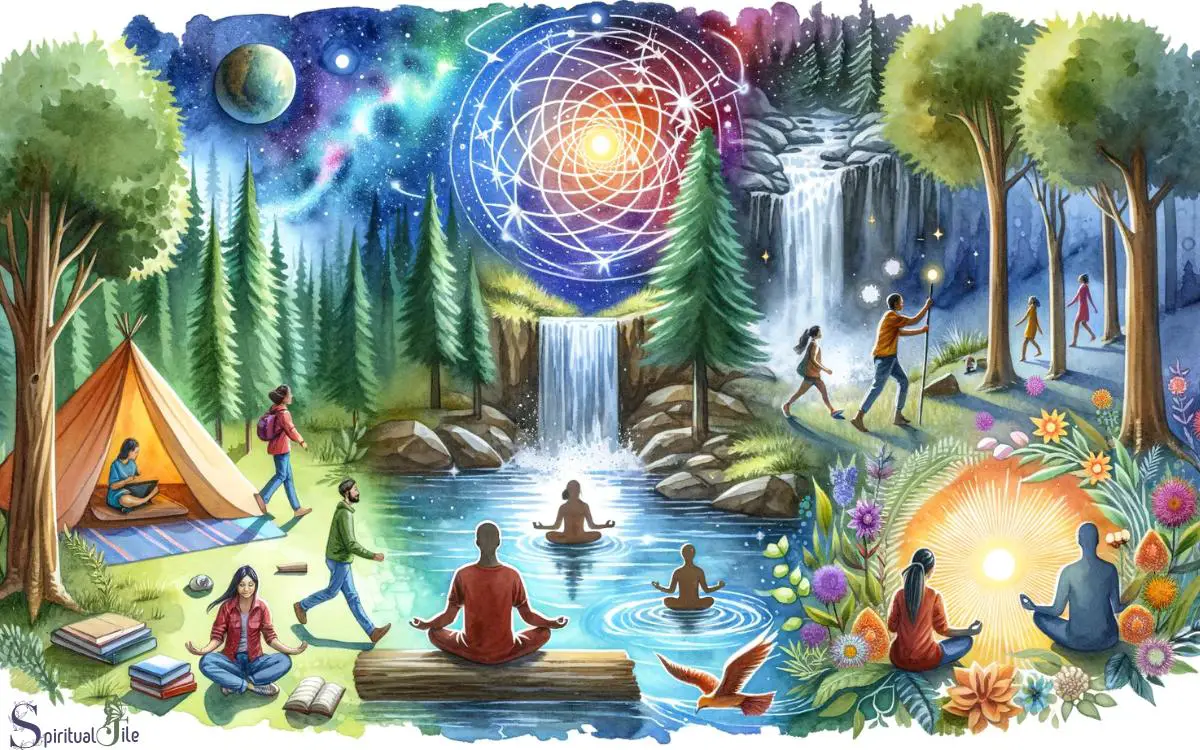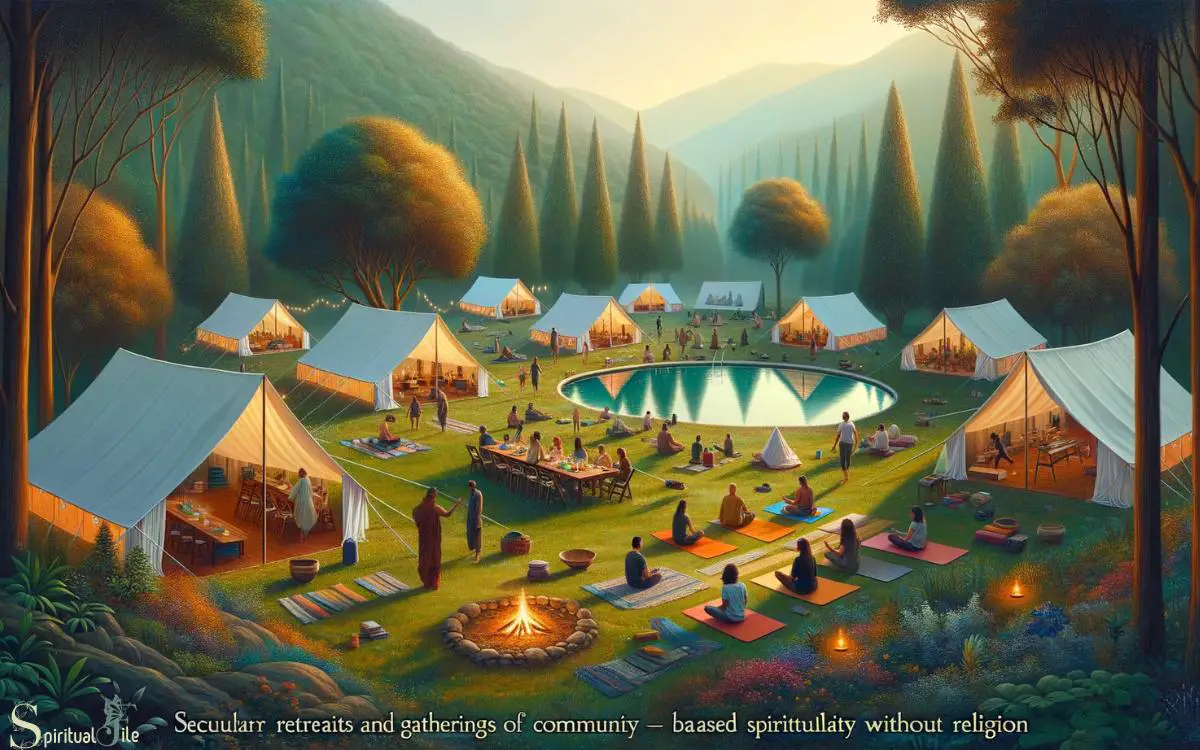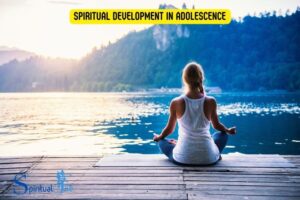Examples of Spirituality Without Religion: Meditating!
Spirituality without religion can be practiced through methods such as meditating, practicing mindfulness, spending time in nature, practicing yoga, and through self-reflection and introspection.

Key Takeaway
8 Interpretations: About Examples of Spirituality Without Religion
| Interpretation | Example |
|---|---|
| Self-Discovery and Mindfulness | Meditation: Many individuals find spirituality without religion through practices like meditation, focusing on self-discovery, inner peace, and mindfulness. |
| Nature and Connection | Forest Bathing: Communing with nature through practices such as forest bathing, where individuals immerse themselves in the natural world, can evoke a sense of spirituality and interconnectedness. |
| Artistic Expression | Music and Art: Engaging in the creation or appreciation of music, art, or other creative pursuits can be a deeply spiritual experience for those who do not identify with religious beliefs. |
| Humanitarian Service | Volunteer Work: Many people discover spirituality through acts of service and helping others, finding a sense of purpose and connection to humanity. |
| Philosophical Reflection | Stoicism: Philosophy, like Stoicism, provides a framework for ethical living and personal development that resonates with individuals seeking spirituality without religious ties. |
Understanding Spirituality Without Religion

Understanding spirituality without religion explores various examples of how individuals can cultivate a spiritual connection without the involvement of organized religions.
Discover ways to tap into your inner self and embrace a personal understanding of spirituality.
Spirituality Vs Religion
Spirituality and religion are two distinct concepts that often get intertwined. Understanding the difference between the two can help shed light on spirituality without religion.
Here’s a breakdown:
Spirituality:
- Focuses on the inner experience and connection with the self and the universe.
- Encourages personal growth, self-reflection, and exploration of the meaning of life.
- Emphasizes the development of values, morals, and ethics.
- Prioritizes mindfulness, meditation, and other practices to cultivate a deeper understanding of oneself and the world.
- Does not rely on specific dogmas or rituals, allowing for a more individualized and flexible approach.
Religion:
- Involves organized belief systems, often with rituals, practices, and a specific set of doctrines.
- Places importance on obedience to a higher power, typically defined by a particular faith.
- Provides a sense of community, shared values, and guidance on moral and ethical behavior based on religious teachings.
- Often has established hierarchies and religious leaders.
- May have specific requirements for prayer, worship, and participation in religious ceremonies.
The Rise Of Secular Spirituality
In recent years, there has been a noticeable increase in the popularity of secular spirituality. This trend highlights the growing number of individuals who seek spiritual fulfillment without adhering to traditional religious frameworks.
Here are some factors contributing to the rise of secular spirituality:
Shifting beliefs:
- Many people are moving away from conventional religious beliefs due to a variety of reasons such as questioning dogmas, encountering conflicting information, or experiencing a loss of faith.
- This creates an opportunity for alternative forms of spirituality that resonate with individuals’ personal experiences and beliefs.
Emphasis on personal experience:
- Secular spirituality encourages individuals to connect with their inner selves and explore their own spiritual journeys.
- It focuses on subjective experiences, personal growth, and self-expression, allowing people to tailor their spiritual practices to suit their unique needs.
Integration of science and spirituality:
- Secular spirituality often incorporates scientific findings and perspectives, blending spiritual beliefs with evidence-based knowledge.
- This integration provides a rational and logical foundation that appeals to individuals who value empirical evidence and critical thinking.
Increased humanistic values:
- Secular spirituality places an emphasis on empathy, compassion, mindfulness, and interconnectedness.
- It encourages individuals to cultivate these qualities, fostering a sense of purpose, fulfillment, and a positive impact on society.
Seekers of meaning and purpose:
- Many people are searching for deeper meaning and purpose in their lives, particularly in an increasingly secular society.
- Secular spirituality offers a framework that allows individuals to explore existential questions, grapple with life’s challenges, and find their own sense of purpose in the absence of religious doctrines.
The rise of secular spirituality reflects a shift in the way individuals seek and experience spirituality.
By embracing personal exploration, integrating science, and focusing on humanistic values, spirituality without religion offers a diverse and inclusive approach to the search for meaning and connection in the modern world.
Personal Practices For Spirituality Without Religion

Discover practical personal practices for finding spirituality without religious beliefs. Explore examples of how to cultivate meaning, connection, and inner peace beyond traditional religious frameworks.
Whether through meditation, nature appreciation, or mindful living, embrace a spirituality that resonates with you.
Mindfulness And Meditation:
By consciously focusing on the here and now, you can deepen your spirituality, cultivate self-awareness, and enhance your overall well-being.
- Meditation is a valuable tool for developing mindfulness.
- Engaging in regular meditation sessions allows you to quiet the mind, achieve mental clarity, and establish a deeper connection with your inner self.
Through meditation, you can explore the depths of your consciousness and tap into a more profound spiritual experience.
Connecting With Nature:

The beauty and serenity of natural environments can inspire feelings of awe and wonder, allowing you to experience a profound sense of interconnectedness with the world around you.
- Nature walks and hikes provide an opportunity to slow down, ground yourself, and immerse in the present moment.
- As you observe the intricate details of nature, such as the vibrant colors of flowers or the gentle swaying of trees, you can experience a sense of harmony and peace within yourself.
- Engaging in activities such as gardening or simply sitting in a park can bring you closer to the rhythms of nature.
- This connection can awaken a deep spiritual awareness and remind you of your place in the vast web of life.
These personal practices offer profound opportunities for self-exploration, enlightenment, and a deeper connection with the universe. Embrace spirituality on your own terms and discover a realm of infinite possibilities.
Community-Based Spirituality Without Religion

Explore examples of spirituality without religion, offering a unique perspective that connects individuals in a meaningful and fulfilling way. Embrace a spiritual journey that celebrates diversity and inclusivity.
Humanist Groups And Organizations:
- Humanist groups and organizations provide a sense of community and support for individuals who are interested in exploring spirituality without religion.
- These groups emphasize the importance of reason, ethics, and compassion in human life, fostering a deep sense of connection and purpose.
- Humanist organizations often offer various activities and events, including discussion groups, lectures, community service projects, and social gatherings, allowing individuals to connect with like-minded people and engage in stimulating conversations.
- Through these groups, individuals can explore and develop their own sense of spirituality by reflecting on their values, purpose, and the interconnectedness of all beings.
Secular Retreats And Gatherings:

- Secular retreats and gatherings offer individuals an opportunity to retreat from their daily routines and immerse themselves in a contemplative and reflective atmosphere.
- These retreats often focus on mindfulness, meditation, and self-exploration, providing a space for individuals to connect with their inner selves and gain a deeper understanding of their spiritual journey.
- Secular retreats may include workshops, guided meditations, nature walks, and other activities that promote self-reflection and personal growth.
- By taking part in these retreats and gatherings, individuals can create a sense of spiritual connection without the framework of religion, finding solace and inspiration in the collective experience.
Community-based spirituality without religion offers individuals the opportunity to explore and nurture their sense of spirituality in a supportive and inclusive environment.
Humanist groups and organizations as well as secular retreats and gatherings provide spaces where individuals can connect with others, engage in meaningful conversations, and embark on a personal journey of self-discovery and spiritual growth.
Can Meditation Help Overcome Spiritual Emptiness?
Meditation has been a powerful tool in helping individuals overcome spiritual darkness examples and find inner peace. By quieting the mind and focusing on the present moment, meditation can help individuals connect with their inner selves and fill the spiritual emptiness they may be experiencing.
Challenges and Critiques

Ethical Concerns and Controversies:
- You can discuss the ethical dilemmas and controversies surrounding a particular topic or issue.
- This could involve questions about the moral implications of certain actions or policies, such as those related to technology, medical advancements, or social practices.
Methodological Limitations and Bias:
- Pertains to the challenges and critiques related to the methodologies used in research or decision-making processes.
- You can explore the limitations of certain research methods, potential biases in data collection and analysis, or issues with the accuracy and reliability of information.
- Discussing the limitations of surveys in capturing complex social attitudes.
Social and Cultural Opposition:

- You can delve into the societal and cultural factors that can lead to opposition or criticism of certain ideas, practices, or policies.
- This might include resistance to changes in traditional norms, cultural clashes, or societal resistance to new technologies and innovations.
- The challenges faced by emerging social movements in the face of cultural conservatism.
Conclusion
Spirituality can arise from various sources and doesn’t necessarily have to be tied to a religious framework.
Whether through activities like meditation, nature connection, or art expression, people find solace and a sense of connection beyond the confines of religious dogma.
By focusing on personal growth, self-awareness, and embracing the interconnectedness of all beings, spirituality without religion empowers individuals to cultivate a deep sense of purpose and meaning in their lives.
It reminds us that spirituality is a personal journey that can be explored in unique and individual ways.
So, if you are seeking spirituality but don’t resonate with organized religion, know that there are countless avenues available to you.
Embrace your own path, and discover the wonders of a spirituality that is authentic to your own beliefs and values.






